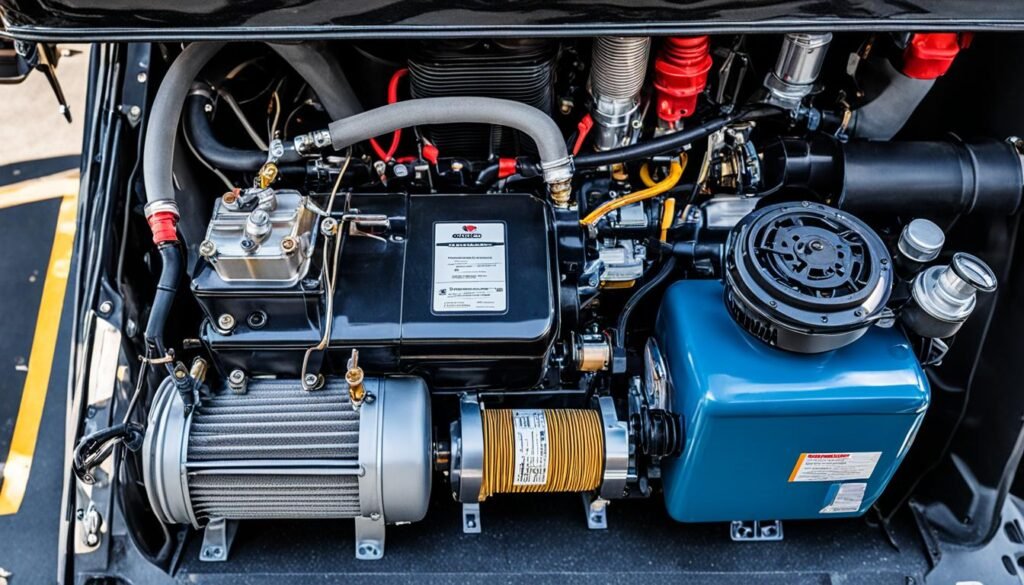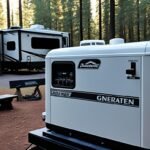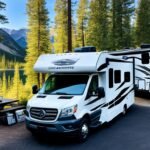Do you get frustrated by sudden power cuts in your RV? The secret to smooth sailing is caring for your RV generator. But how do you begin? This detailed guide will explore the usual generator problems and how to solve them. We’ll ensure your second home always has power, no matter your journey.
Key Takeaways
- RV generators are key for powering your RV’s gadgets and comforts. They let you live like you’re at home while on the move.
- Keeping your RV generator in good condition is vital. Regular checks and fixes help avoid surprise blackouts.
- This guide highlights common RV generator troubles and fixes. It covers everything from fuel system to electrical checks.
- With the advice here, your RV generator will keep running, powering your travels. Wherever you go, power stays with you.
- With the right care, you can dodge expensive fixes and make your generator last longer. Good maintenance is key.
Introduction to RV Generators
RV generators are vital for a comfy and convenient adventure with your vehicle. They power everything from lights to kitchen gadgets and gadgets for fun. Without them, you’re missing out on some serious outdoor fun.
Understanding the Importance of RV Generators
RV generators are essential for your vehicle’s full power. They bring home’s comfort even when you’re far from power. Be it remote camps or tailgating fun, a good generator makes it all possible.
Common Issues and the Need for Proper Maintenance
- Fuel system problems: Clogged lines or bad fuel can mess up your generator.
- Oil trouble: Wrong oil levels or poor oil can damage your generator.
- Electrical malfunctions: Wiring and battery problems could make your generator fail.
Maintaining your RV generator keeps it running well. Regular upkeep and following the manual keep it working longer. This way, you have power whenever and wherever you want.
Taking care of your RV generator is critical for a great time outdoor. By knowing the importance and doing regular maintenance, your RV becomes a hub of adventure. This ensures great memories on every trip.
Preparing for Generator Maintenance
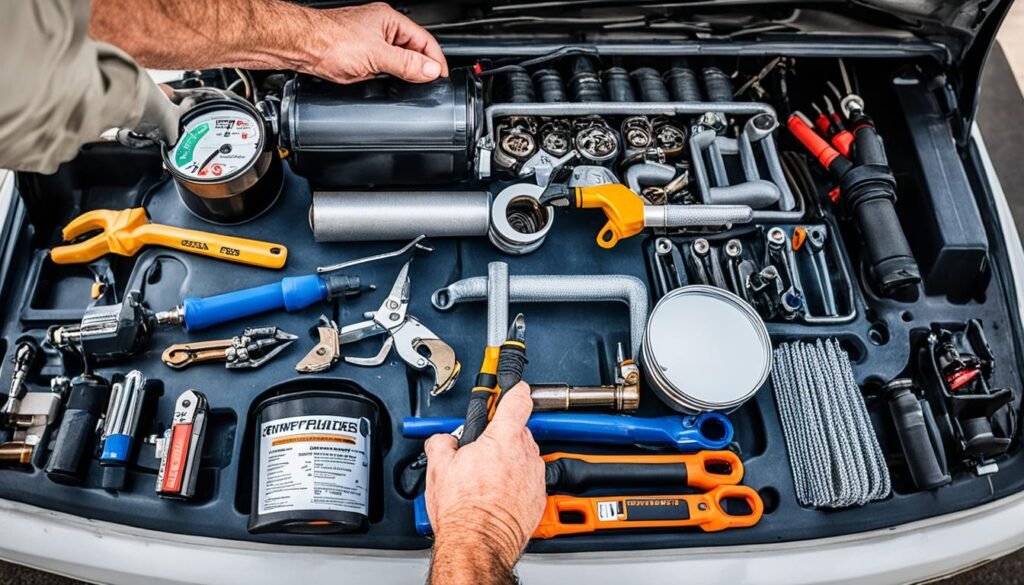
First, read the owner’s manual for your RV generator. It gives important advice on how to care for your specific model. Following these instructions closely will make your generator last longer and work better. It’s key to making maintenance easy.
Consulting the Owner’s Manual
The RV generator’s manual is full of useful info. It tells you when to do oil changes, change air filters, and more. It also points out what kind of oil and filters your generator needs. Knowing this saves time and money.
Gathering Necessary Tools and Supplies
Now, gather all the tools and supplies you need, based on what the manual says. You might need oil and air filters, and special cleaning tools. Having everything ready means maintenance will go smoothly and quickly. You won’t have to stop your trip for long.
To keep your generator in top shape, the manual says to run it every month for at least an hour. Make sure it’s got a good load, nothing less than 20 Amps. But don’t start or stop it while powering something. Running it every so often without a load helps your generator last longer.
Regular care is crucial to your generator’s health. It should be worked out once a month for an hour. Always check the oil level, as low oil stops the generator and can harm its engine.
By being smart and prepared, our RV generator can handle any maintenance. With the right tools ready, we’re set to keep our generator running smoothly. This keeps our travels worry-free.
Fuel System Maintenance
Maintaining your RV generator’s fuel system is key to it working right for a long time. Two big parts of this are checking the fuel and looking at the fuel lines and filters.
Checking Fuel Level and Quality
First, make sure your RV’s fuel level is over one-quarter full. This is because many generators stop to protect the engine if fuel gets too low. Also, keep an eye on the fuel’s quality to avoid any issues.
Always use clear, new fuel. If the fuel looks weird or smells bad, swap it out. Having good fuel is vital for your RV generator fuel system to run well.
Inspecting Fuel Lines and Filters
Now, check the RV generator fuel lines and filters. Make sure they’re not worn out, damaged, or blocked. See if there are any tears, leaks, or twists in the lines. And the filters need to be clean and working right.
- Inspect fuel lines for cracks, leaks, or kinks that could restrict fuel flow.
- Check the fuel filters for any signs of contamination or blockage, and replace them as needed.
- Make sure all fuel line connections are tight and secure to prevent air leaks.
Making sure your RV generator fuel system is in good shape is crucial. By checking things like fuel level, quality, and the filters, you keep your generator running well. This saves you from big repair costs later on.
Oil and Lubrication Checks
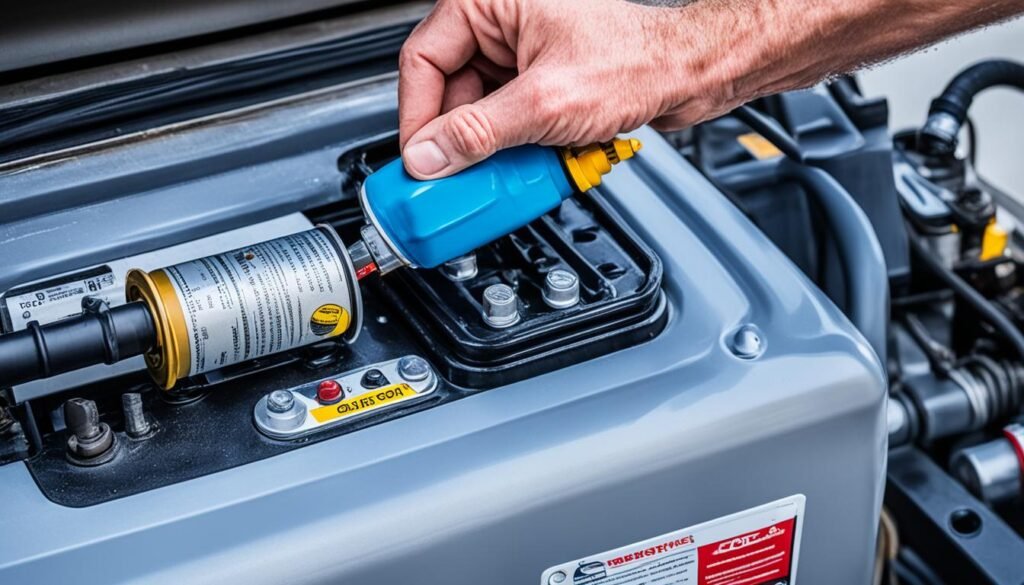
Keeping your RV generator’s oil and lubrication in good shape is key. It’s vital for your generator to run smoothly and last longer. Regular oil checks can save you from expensive repairs.
Checking Oil Level and Condition
To see how much oil you have, find the dipstick and pull it out. Clean it with a cloth, put it back in, and take it out again. Make sure the oil is at the proper level marked on the dipstick. If it’s low, pour in the right amount and type of oil until it’s right.
Also, look at the oil’s color and smell for any issues. Good oil is clear and light amber; bad oil might be dark, gritty, or smelly. If your oil is bad, it’s time for a change.
Changing the Oil and Filter
- The oil drain plug is usually at the bottom of the oil pan. Put a catch under it to hold any dripping oil.
- Use a wrench to unscrew the drain plug and let all the old oil leak out.
- Put the drain plug back and make sure it’s tight.
- Find and remove the old oil filter. It may need a wrench to come off easily.
- Before putting on the new oil filter, add a bit of new oil to the rubber seal. Then screw it on by hand until it’s snug.
- After that, add the new oil as told in your manual.
- Don’t forget to close the oil fill cap. Start the generator for a bit to move the new oil around.
- After running it for a few minutes, check the oil level again and top off if needed.
Changing the oil and filter every 150-200 hours is a must. This keeps your RV generator in great working order.
“Regular oil and lubrication checks are the key to keeping your RV generator running at its best. Don’t neglect this important maintenance task.”
Air Intake and Exhaust System Inspection
Taking care of your RV generator’s air intake and exhaust is vital. It helps the generator work well and last longer. So, it’s key to make sure your RV generator air intake and RV generator exhaust system are in good condition.
Cleaning or Replacing Air Filters
The RV generator air filter keeps air clean and safe as it goes into the generator. If it gets dirty, the generator must work harder and might overheat. Here’s how to keep it clean:
- Regularly check the air filter, often every 200 hours or yearly as the maker advises.
- Tap the air filter gently on a hard place to get rid of loose dirt. Don’t use compressed air as it may harm the filter.
- If it’s very dirty or torn, change it for a new one to keep air flowing well and the engine protected.
Checking Exhaust System for Leaks or Obstructions
The RV generator exhaust system gets rid of harmful gases safely. It’s essential to keep it working right:
- Look for cracks, damage, or leaks that could let carbon monoxide escape.
- Make sure nothing is blocking the exhaust system to keep it working properly.
- If you notice any problems, have a professional check and fix them. This ensures your generator works safely and reliably.
| Maintenance Frequency | Recommended Actions |
|---|---|
| After Every Storm | Do a quick check of the air intake and exhaust system. |
| Quarterly | Look closely at the air intake and exhaust system. |
| Annually | Change the air filter following the maker’s guide. |
Watching over your RV generator air intake and RV generator exhaust system is key. It keeps your generator running well, lasting longer, and offering dependable power when you need it.
RV Generators
Your RV’s true potential relies on the power source it uses – the generator. These generators vary in power to meet different RV owners’ needs. It’s vital to know your generator’s power output to prevent damage from overloading.
Understanding the Power Output of Your Generator
There’s a variety of RV generators to choose from. For instance, the Quiet Gasoline range goes from 2.8 to 7.0 kilowatts for gasoline models. For those using propane, the range is 2.5 to 6.5 kilowatts.
The Quiet Diesel series offers even more power, from 6.0 to 12.5 kilowatts. This is perfect for bigger RVs like luxury diesel pushers. Always match your generator size to your RV’s needs.
Managing Electrical Load and Appliance Usage
It’s key to balance your appliances and how you use them to keep your RV running smoothly. Look for the wattage or amp requirements on your appliances. For example, a coffee pot at 120 volts and 5 amps equals 600 watts.
Appliances with motors need more power when they start, up to six times their usual need. So make sure your generator can handle these initial surges.
A 2.8-kilowatt generator is good for one 13,500 BTU rooftop air conditioner. It leaves enough power for other appliances and lights. This ensures a steady power flow for your RV’s needs.
“Cummins Onan RV generators are designed to comply with or exceed noise regulations set by the National Park Service, ensuring quiet operation in parks and campgrounds.”
Battery and Electrical System Checks
Keeping your RV’s electrical system healthy is key for a trustworthy RV generator. This generator needs a 12V battery to start and work. So, check the battery’s connections and its charge often to dodge problems.
Inspecting Battery Connections and Charge Level
Start by making sure the battery connections are snug and clean. If you spot any grime, scrub off the terminals with a wire brush or a mix of baking soda and water. Then, test the battery’s charge with a voltmeter. For a good battery, it should read 12.6V or more. If it’s not, think about charging it. You might also need to get a new one if the current battery is showing signs of age or damage.
Checking Wiring and Electrical Components
Next, look at all the wiring and parts of your RV generator closely. Check for any wires that are torn, cracked, or loose, and ensure all the parts are firmly connected. It’s important to pay extra attention to the wires linking the generator to the RV. Problems here can stop the generator from working right.
| RV Class | Shore Power Requirement |
|---|---|
| Class A | 50-amp |
| Class B | 30-amp or 20-amp |
| Class C | 30-amp, some larger models require 50-amp |
Think about making your RV’s electrical system better with things like solar panels, strong lithium batteries, and intelligent monitoring systems. These upgrades can make you less dependent on shore power and boost your ability to be off-grid. Remember, keeping up with the maintenance of your RV’s electrical system is vital. It ensures your RV generator runs well and that your RV’s electrics as a whole are in top shape.
“Maintaining the battery and electrical system of your RV generator is essential for ensuring reliable power and a safe, enjoyable RV experience.”
Troubleshooting Common Issues
If your RV generator won’t start or has power problems, don’t worry. There are steps you can take to fix this. Let’s look at the usual issues and how to solve them.
Identifying and Resolving Starting Problems
Issues starting RV generators might come from weak or dead batteries. A battery with less than 12 volts needs a charge or new battery. Doing regular checks on the battery’s terminals and connections helps prevent these issues.
Clogged air filters, spark plug problems, and fuel system faults can make your generator hard to start. Check these parts one by one and fix what’s wrong. This often gets your generator working without needing a pro’s help.
Addressing Power Output Issues
To keep a steady power, your generator’s voltage must be stable. Generators with automatic voltage control do this. Make sure not to overload the generator. This can mess up the voltage.
Dirty filters can make power unstable. Change filters often. Noises from the generator can warn of problems. Different sounds mean different things. Checking vibrations can tell you a lot. Secure mounting stops loud vibrations.
If your generator’s power is unstable, start with the fuel and air filters. Make sure all electrical parts are in good shape. Fixing these often makes your generator work fine again.
“Maintaining your RV generator is crucial for ensuring reliable power during your adventures. By understanding and addressing common issues, you can keep your generator running smoothly and avoid unexpected breakdowns.”
Conclusion
Keeping your RV generator in top shape is key for smooth travels. Follow the advice in this guide. This includes looking at your manual, doing regular checks, and fixing common problems. By doing this, you ensure your RV has the power it needs without hitches.
Taking care of your generator makes your RV journey better. It doesn’t matter if it’s inside the RV or you can carry it. Knowing how much electricity you use, and fixing issues is important. This way, your RV trip will be a hit every time.
Making sure your RV generator is well-maintained offers more than just power. It gives you the freedom to enjoy nature and make precious memories along the way. Explore our blogs for useful information like this.
FAQ
How important are RV generators?
What are some common issues with RV generators?
How do I prepare for RV generator maintenance?
How do I maintain the fuel system of my RV generator?
How do I check and change the oil in my RV generator?
How do I maintain the air intake and exhaust system of my RV generator?
How do I manage the power output of my RV generator?
How do I maintain the battery and electrical system of my RV generator?
How do I troubleshoot common issues with my RV generator?
Source Links
- A Comprehensive Guide to Troubleshooting Your RV Generator – https://www.mainlinetruck.com/how-to-troubleshoot-your-rv-s-generator
- Carolina Coach & Camper | Blue Compass RV – https://www.carolinacoach.com/blog/a-beginners-guide-to-rv-generators–29279
- Official RV 101® Guide to RV Generators – https://rvonlinetraining.com/p/official-rv-101-guide-to-rv-generators
- Generator for RV: Understand the Basics | RV Repair Club – https://www.rvrepairclub.com/video/generator-for-rv-understanding-the-basics-007982/
- AP Electric & Generators LLC – https://apelectric.com/all-generators/rv-commercial-mobile-generators-3-6-20kw
- How To Maintain an RV Generator – https://blog.campingworld.com/learn-to-rv/how-to-maintain-a-generator/
- Proper RV Generator Storage and Maintenance | Coach-Net – https://blog.coach-net.com/2015/12/16/proper-rv-generator-storage-and-maintenance/
- Tech Tips – Important Generator Maintenance – https://rvlife.com/tech-tips-maintaining-your-rv-generator/
- Prepping Your RVs Generator for Another Season – https://www.rv.com/servicing-care/safety-maintenance/prepping-your-rvs-generator-for-another-season/
- Preventive Maintenance Checks for RV Generators – RVing Today – https://rollinontv.com/preventive-maintenance-checks-for-rv-generators/
- Regular Generator Maintenance Basics – https://www.harvesthosts.com/blog/regular-generator-maintenance
- A Quick Guide to Generator Care and Maintenance – https://www.rv.com/servicing-care/safety-maintenance/a-quick-guide-to-generator-care-and-maintenance/
- Generator Oil Guide – How to Maintain Your Generator In Extreme Conditions – https://www.electricgeneratorsdirect.com/stories/607-How-to-Maintain-Your-Generator-In-Extreme-Conditions.html
- RV Engine and Generator Oil Change – https://jackfurriers.com/rv-engine-and-generator-oil-change
- 8 Generator Maintenance Tips for Summer & Hot Weather – https://www.wpowerproducts.com/blog/generator-operation-maintenance/hot-weather-generator-maintenance-tips/
- Cummins Standby Generator Maintenance Checklist – https://buckeyepowersystems.com/pages/cummins-standby-generator-maintenance-checklist
- What does an NRVIA RV Inspector inspect during an RV inspection? – https://myrvresource.com/rv-enthusiast-resources/what-does-an-nrvia-rv-inspector-inspect-during-an-rv-inspection
- Services — Moore RV Inspections – https://www.moorervinspections.com/services
- Cummins Onan RV Generators including Diesel, Gasoline, Propane and Gas – https://norwall.com/categories/rv-generators/
- RV Generators – https://www.campingworld.com/generators
- RV Generators – https://www.electricgeneratorsdirect.com/power/rv-generators.html
- The Basics of RV Electrical Systems – Leisure Coachworks – https://leisurecw.com/rv_repairs/the-basics-of-rv-electrical-systems/
- The Basics of RV Power: How It Works and What You Need to Know – https://www.chillrv.com/single-post/how-will-the-rv-be-powered-electric-hook-up-generator-and-battery-explained
- How Does an RV Electrical System Work? – https://technorv.com/blogs/articles/how-does-an-rv-electrical-system-work
- Common RV Generator Issues and How to Fix Them – https://rockymountaingeneratorsupply.com/blog/13337/Common-RV-Generator-Issues-and-How-to-Fix-Them
- Generator Troubleshooting Guide – https://www.webstaurantstore.com/guide/978/generator-troubleshooting-guide.html
- RV Generator Troubleshooting Guide – http://rvissues.com/troubleshooting/rv-generator/rv-generator-troubleshooting-guide/
- RV Generators: Need-To-Know Information – https://iwae.com/resources/articles/rv-generators-need-know-information.html
- Portable Generator for RV: Your Ultimate Guide – https://tomahawk-power.com/blogs/articles/portable-generator-for-rv-your-ultimate-guide
- Solar Generators for RV Camping: a Complete Guide – https://www.renogy.com/blog/solar-generators-for-rv-camping-a-complete-guide/


